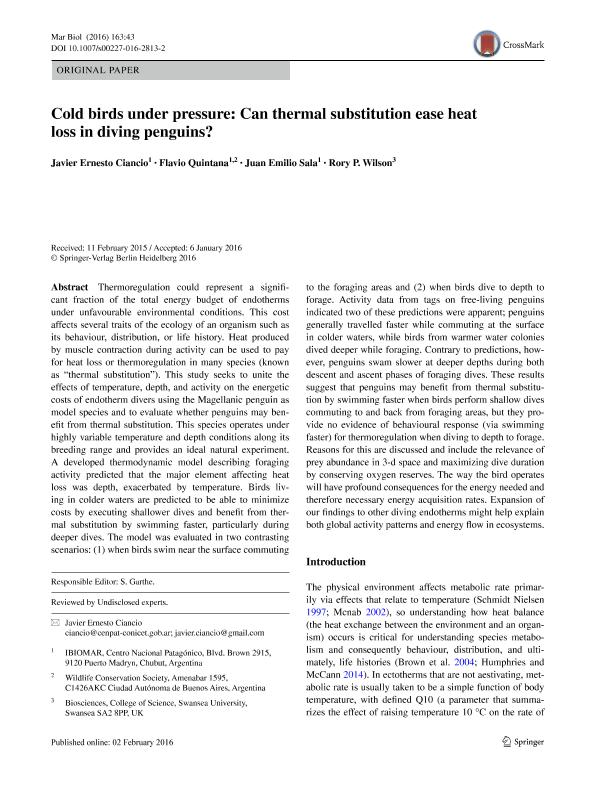Artículo
Cold birds under pressure: Can thermal substitution ease heat loss in diving penguins?
Fecha de publicación:
02/2016
Editorial:
Springer
Revista:
Marine Biology
ISSN:
0025-3162
Idioma:
Inglés
Tipo de recurso:
Artículo publicado
Clasificación temática:
Resumen
Thermoregulation could represent a significant fraction of the total energy budget of endotherms under unfavourable environmental conditions. This cost affects several traits of the ecology of an organism such as its behaviour, distribution, or life history. Heat produced by muscle contraction during activity can be used to pay for heat loss or thermoregulation in many species (known as “thermal substitution”). This study seeks to unite the effects of temperature, depth, and activity on the energetic costs of endotherm divers using the Magellanic penguin as model species and to evaluate whether penguins may benefit from thermal substitution. This species operates under highly variable temperature and depth conditions along its breeding range and provides an ideal natural experiment. A developed thermodynamic model describing foraging activity predicted that the major element affecting heat loss was depth, exacerbated by temperature. Birds living in colder waters are predicted to be able to minimize costs by executing shallower dives and benefit from thermal substitution by swimming faster, particularly during deeper dives. The model was evaluated in two contrasting scenarios: (1) when birds swim near the surface commuting to the foraging areas and (2) when birds dive to depth to forage. Activity data from tags on free-living penguins indicated two of these predictions were apparent; penguins generally travelled faster while commuting at the surface in colder waters, while birds from warmer water colonies dived deeper while foraging. Contrary to predictions, however, penguins swam slower at deeper depths during both descent and ascent phases of foraging dives. These results suggest that penguins may benefit from thermal substitution by swimming faster when birds perform shallow dives commuting to and back from foraging areas, but they provide no evidence of behavioural response (via swimming faster) for thermoregulation when diving to depth to forage. Reasons for this are discussed and include the relevance of prey abundance in 3-d space and maximizing dive duration by conserving oxygen reserves. The way the bird operates will have profound consequences for the energy needed and therefore necessary energy acquisition rates. Expansion of our findings to other diving endotherms might help explain both global activity patterns and energy flow in ecosystems.
Palabras clave:
Bioenergetics
,
Heat Balance
,
Cost of Transport
,
Endotherms
Archivos asociados
Licencia
Identificadores
Colecciones
Articulos(IBIOMAR)
Articulos de INSTITUTO DE BIOLOGIA DE ORGANISMOS MARINOS
Articulos de INSTITUTO DE BIOLOGIA DE ORGANISMOS MARINOS
Citación
Ciancio Blanc, Javier Ernesto; Quintana, Flavio Roberto; Sala, Juan Emilio; Wilson, Rory P; Cold birds under pressure: Can thermal substitution ease heat loss in diving penguins?; Springer; Marine Biology; 163; 2; 2-2016; 1-15
Compartir
Altmétricas




